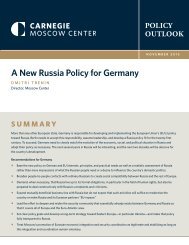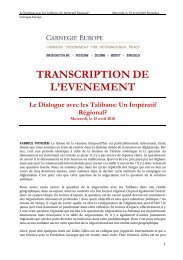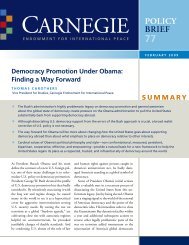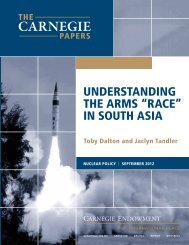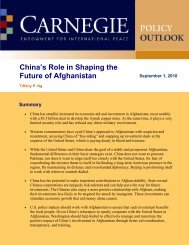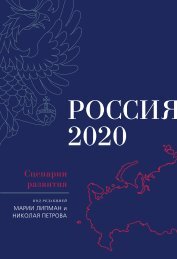Full Text (PDF) - Carnegie Endowment for International Peace
Full Text (PDF) - Carnegie Endowment for International Peace
Full Text (PDF) - Carnegie Endowment for International Peace
Create successful ePaper yourself
Turn your PDF publications into a flip-book with our unique Google optimized e-Paper software.
Rosneft, the only one out of all Russian oil VICs, tried to diversify into the coal industry. Sergei<br />
Bogdanchikov said in 2001 that Rosneft was to become a full-fledged energy holding with<br />
annual coal production of 30-40 million tons, and, in line with these ambitions, SMNG acquired<br />
a 55% stake in the Sakhalin Boshnakovsk Coal Mine in 2002. Rosneft planned to mine coal in<br />
East Siberia, Kuzbass and the center of Russia and intended to enter the coal market in<br />
cooperation with Mezhprombank. To this end Rusugol (Russian Coal), a JV between Rosneft<br />
and Mezhprombank, was established in 2001. However, two years later Rosneft withdrew from<br />
the JV.<br />
Rosneft was also mak ing resolute ef<strong>for</strong>ts to expand its lost downstream positions. One of its<br />
major investment projects is the $700 million upgrading of the Komsomolsk refinery. Besides,<br />
Rosneft further consolidated its export positions in the Far East by buying shares of the Eastern<br />
Oil Loading Terminal in spring 2003 (now it has 3 ports in the Far East).<br />
In addition, Rosneft is recapturing a niche in the fuel market of Moscow. In 2005, it opened its<br />
first gasoline filling station that used to operate under YUKOS brand name. 32 In the nearest<br />
future another five fuel retail outlets bearing Rosneft brand will open in Moscow. Rosneft needs<br />
presence in the Moscow market both to enhance its image and because after its acquisition of<br />
Yuganskneftegas, the company faces a shortage of refining capacity and retail network.<br />
Taming of the Shrews<br />
Parallel to the strengthening of its production positions, Rosneft was cementing its corporate<br />
structure. Bogdanchikov managed to quickly tighten his grip on its independent minded<br />
subsidiaries b y installing loyal executives and boards of directors in Purneftegas and<br />
Sakhalinmorneftegas and establishing very strict control over managers' activities: they had to<br />
get Bogdanchikov's approval on such issues as personnel structures, business plans, contracts<br />
and loans, communications with the state and regional authorities. Rosneft introduced a policy<br />
whereby all crude exports by the subsidiaries were to be channeled through the holding<br />
company. 33<br />
In 2000, Rosneft got the permission of the RF Anti-Monopoly Ministry to increase its stake in<br />
subsidiaries to 75% and began to buy their shares through affiliated companies. This process was<br />
accompanied by many scandals in the best Russian traditions. Experts commented that “Rosneft<br />
organized the process in such a way that shareholders had no right to demand buyout of shares<br />
by the issuer at market prices…. The state company selected assets itself, priced them itself using<br />
unclear methodology and took them away.” 34<br />
The most serious battles were fought over Krasnodarneftegas, a 1.5 million tons oil producer<br />
located in the South of Russia. In the late 1990s, Rosneft practically lost control over its<br />
subsidiary and did not even have majority in its Board of Directors. Actually, Krasnodarneftegas<br />
was under the real control of Alexander Putilov, the <strong>for</strong>mer Rosneft President, since 1997. Other<br />
shareholders of Krasnodarneftegas acted in a very coordinated fashion blocking all initiatives of<br />
Rosneft aimed at establishing control.<br />
However, in the “Putin's Russia” Bogd anchikov got an important trump card in his ef<strong>for</strong>ts to<br />
make his “prodigal daughter” come to heel: in July 2000 the session of the RF government was<br />
held where the issue of the controlling interest in KNG was discussed with the involvement of<br />
the General Prosecutor Office, the Ministry of Internal Affairs and the Federal Security Service.<br />
32 Vedomosti, 08.09.05.<br />
33 NefteCompas, May 29, 1999, p. 6.<br />
34 Oil and Capital, # 3, 2002, p. 23.<br />
10




